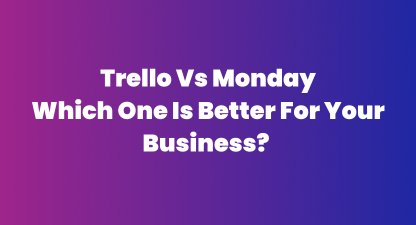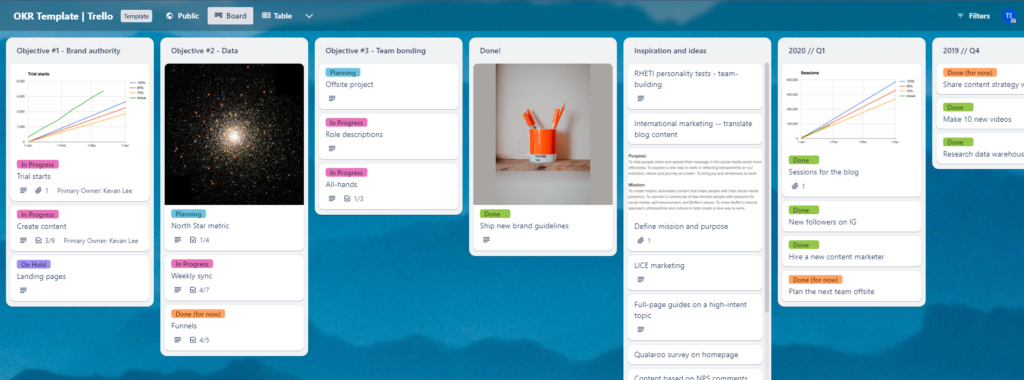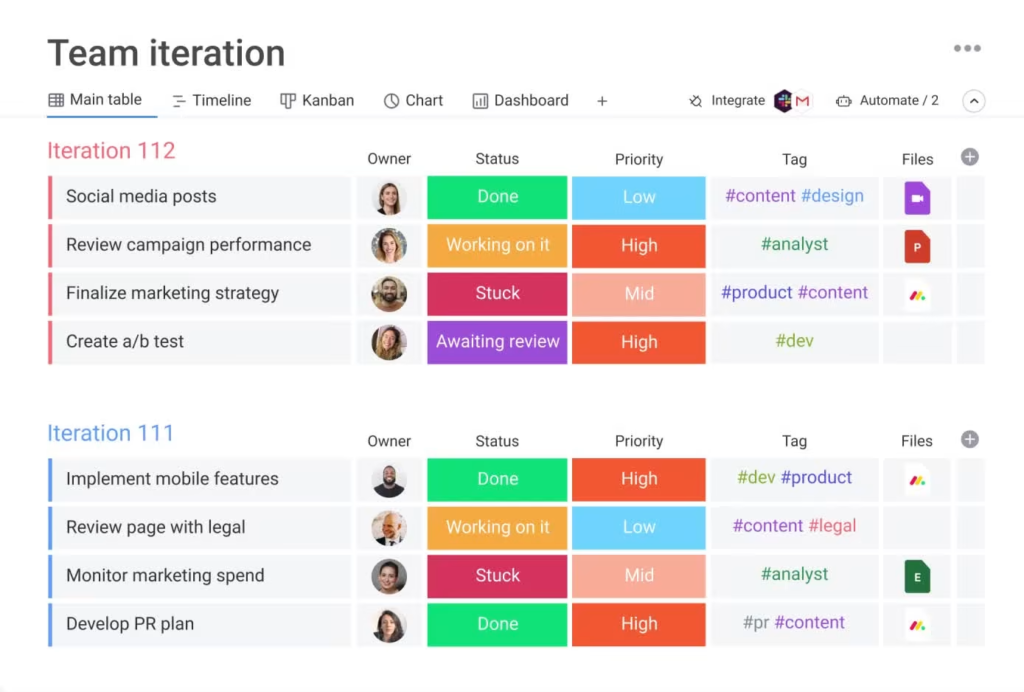
Have you ever felt overwhelmed by the complexity and uncertainty of managing projects? If so, you are not alone. Many firms, whether they are small or enterprise-level, face the same challenge of delivering value to their customers and stakeholders while achieving their strategic business goals. A well-aligned project management software solution to business architecture proves to be a valuable asset, as it helps to organize, coordinate, and control projects effectively. With no surprise many enterprises seek help when it comes time to adopt a right tool out of many remarkable tools available in market.
Two of the more prominent products, Atlassian’s Trello and Monday work management, can help your organization stay on top of its projects. This article will perform a detailed comparison of both tools to give you helpful insights on factors to consider while choosing the right tool for your business.
So, are you ready to dive in? Let’s get started!
Overview Of Trello And Monday
Before we delve into the detailed comparison, let’s get a bird’s eye view of Trello and Monday.
Trello: Visual, Flexible, and Collaborative
Trello is a highly visual and user-friendly project management tool that’s known for its simplicity and flexibility. It’s designed around the concept of boards, lists, and cards, which can be customized to fit your specific project management needs.

Key Features of Trello:
- Kanban Boards: Trello’s boards serve as the main organizing structure. You can create a board for each project, and within the boards, you have lists for different stages of your project.
- Lists and Cards: Cards represent tasks or items to be completed. You can add descriptions, checklists, due dates, attachments, and labels to cards. All cards are organized in different lists according to the workflow of project.
- Trello Views: Visualise your projects with Boards, Timeline, Table, Calendar, Dashboard, Map and Table views.
- Smart Links: Trello supports a ‘Smart Links’ feature that surfaces work from other tools to Trello and allows collaboration on up-to-date information without switching between tools.
- Power-Ups: Trello offers 200+ of integrations with other popular tools like Slack, Google Drive, and more.
- Workflow automation: With Trello’s in-built automation tool called Butler, efficient workflows can be developed by creating rules, buttons, and commands.
Monday: Customizable Work Operating System
Monday, on the other hand, positions itself as a Work Operating System. It’s designed to be highly customizable and adaptable to diverse workflows. Monday.com splits its functionality between three narrowly tailored products to better serve teams belonging to enterprise, non-profit, and small businesses: Work Management, Sales CRM and Dev.

Key Features of Monday:
- Workspaces: Create different workspaces to segregate different teams, departments, or projects.
- Project Views: For a holistic overview of projects, Monday.com offers 27+ views like Kanban, Gantt, Calendar, Timeline and Map etc.
- Customizable Templates: You can create custom workflows using 200+ pre-designed templates or design your own. This makes Monday suitable for a variety of industries and use cases.
- Customized Dashboards: Develop customized dashboard with 25+ drag-and-drop widgets to make data-driven decisions on project progress and KPIs.
- Workflow Builder: It allows users to visually build project tasks workflow. Incorporating automation features give more strength to create error-free process workflow.
- Automation: Monday has advanced features for automating workflows.
For a more detailed comparison, you can check out this article on Forbes.
Now that we have a broad understanding of these tools, let’s dive deeper into the comparison.
Trello Vs Monday: Detailed Comparison
Let dive in for a detailed comparison of Trello and Monday based on main factors:
User Interface
The user interface of a project management tool plays a crucial role in user adoption and productivity. Here’s how Trello and Monday stack up in this department:
Trello: Trello is celebrated for its clean and intuitive interface. The Kanban-style boards are easy to grasp, and the drag-and-drop functionality allows for effortless task management. Customization options, while available, may be limited compared to Monday.
Monday: Monday offers a more structured interface with extensive customization. This flexibility can be a double-edged sword – it allows for tailored workflows but might require more time to set up and adapt to. Users who appreciate a highly adaptable workspace may find Monday’s interface more appealing.
Features
The features are at the core of project management software utility. Let’s examine the strengths and weaknesses of Trello and Monday’s feature sets.
Features | Trello | Monday.com |
Project Planning
| Kanban boards, timeline view, lists, cards, checklists, labels, members and due date | Task List View, Kanban board, timeline and Gantt view, tasks, sub-tasks, tags, assignee and due date |
Task Management | Need to set custom fields for task’s status, priority, risk-level and time/effort estimates | Task status, priority, time/effort estimates are available in each task |
Task Dependencies | Not built-in – Need to setup checklists and link cards to represent task dependency | Boards linking, sub-tasks and Dependency Colum (built-in) |
Time tracking | Not built-in – Need third-party power-Up | Native time tracking |
Custom Fields/Column types | Supports limited formats | Supports variety of formats, see here. |
Gantt View | Not built-in – Need third-party | Built-in Gantt View |
Reporting Dashboards | Limited reporting and analytics features, mostly through power-ups | Advanced reporting and analytics features, with dashboards and widgets |
Team Collaboration | Supports team collaboration, comments, attachments, and notifications | Supports team collaboration, comments, attachments, and notifications |
Budget, Time and effort calculation | Smart Fields (third-party) | Formula Column (built-in) |
Automation | Offer automation through Butler, but not advance as Monday.com | Robust automation ability with complex requirements |
Storage | Unlimited File Storage | Limited File Storage |
Integrations
Integration with other tools and software is essential for seamless workflow. Let’s see how Trello and Monday fare in this regard.
Trello: Trello offers a range of integrations, including popular tools like Slack, Google Drive, and Jira. These integrations ‘Power-Ups’ enhance its functionality and make it a versatile choice for various work environments.
Monday: Monday boasts an extensive library of integrations, covering a broad spectrum of business needs. The ability to connect with different software applications and services can significantly enhance productivity and collaboration.
Pricing
Pricing is a significant factor for many businesses when choosing a project management tool. Here’s a breakdown of the pricing structures for Trello and Monday:
Trello offers 14 days trial period with following price plans (Trello):
- Free: $0 – All necessary features for whole team or individual
- Standard: $5/user/month – For small teams who manage work at scale
- Premium: $10/user/month – Advance project visualisation and tracking features
- Enterprise: $17.50/user/month – enterprise level features with enhanced security and controls
Monday.com offers 14 days trial period with following price plans (Monday):
- Individual: Free – 2 users, personal use only
- Basic: $8/user/month – work management only
- Standard: $10/user/month – multiple views, automation and integration features
- Pro: $16/user/month – scaled automation and integration features at scale for complex workflows
- Enterprise: Contact for quote – enterprise level features
Advantages And Disadvantages Between Both Tools
Let’s summarize the advantages and disadvantages of both Trello and Monday:
Trello Advantages:
- User-Friendly: Trello’s interface is easy to learn and navigate.
- Visual: Ideal for projects that benefit from a visual, Kanban-style approach.
- Wide Adoption: Free plan make it popular among small teams and freelancers.
Trello Disadvantages:
- Limited native features: Time tracking, Gantt chart, Budgeting and Invoicing etc.
- Limited Customization: May not be suitable for complex workflows.
- Automation Options: Less robust than Monday’s automation capabilities.
- Reporting: Basic reporting may not meet the needs of larger organizations.
Monday Advantages:
- Highly Customizable: Monday’s flexibility allows for tailored workflows.
- Advanced Automation: Excellent for organizations that require automated processes.
- Integration: Extensive integration options enhance productivity and collaboration.
- Visual Dashboards: In-depth reporting and visual insights.
Monday Disadvantages:
- Learning Curve: Monday’s extensive customization may require a learning curve.
- Setup Time: Setting up workflows may take longer compared to Trello.
- Pricing: Pricing may be less competitive for very small teams.
Specific Use Cases For Each Tool
To help you further decide between Trello and Monday, let’s explore specific use cases where each tool excels.
Trello:
- Small Teams and Start-ups: Trello is an excellent choice for small teams, start-ups, and freelancers who value simplicity and quick setup.
- Creative Projects: Trello’s visual nature is well-suited for creative projects, such as marketing campaigns, design work, and content creation.
- Agile Development: Trello’s boards and cards align well with agile project management principles.
Monday:
- Large Organizations: Monday’s scalability and customization make it ideal for larger organizations with complex workflows.
- Project-Intensive Industries: Monday shines in industries with project-heavy work, such as construction, manufacturing, and software development.
- Automation-Centric Workflows: If your organization heavily relies on automation to streamline processes, Monday’s advanced automation capabilities are a big advantage.
For more insights of feature comparison visit article published by TechRepublic.
Tips/Considerations When Making A Decision
Choosing between Trello and Monday isn’t just about comparing features—it’s about aligning the tool with your specific needs. Here are some considerations:
- Team Size: For small teams, start-ups, and freelancers, Trello’s simplicity may be a better fit. Larger organizations with complex processes may lean toward Monday’s customization.
- Project Complexity: Consider the nature of your projects. If they involve intricate workflows with many dependencies, Monday’s advanced automation can be a significant advantage.
- Budget Constraints: Trello offers competitive pricing for small teams, while Monday may be more cost-effective for larger organizations.
- Need for Automation: If automation is a top priority, Monday’s robust automation capabilities might be a game-changer.
Grab The Right Tool Today With IT Visionists
Making the right choice between Trello and Monday can significantly impact your team’s productivity and the success of your projects. At IT Visionists, we understand the importance of selecting the right project management tool for your business. Our team of experts can provide you with tailored guidance, consulting, and support services to ensure that your choice aligns with your business goals and objectives.
If you have questions, need further assistance, or want to explore the capabilities of Trello and Monday, get in touch with IT Visionists today. We are here to help you make the most informed decision for your business’s project management needs.
Frequently Asked Questions
How Much Does Trello Cost?
Trello offers a free plan with basic features. Paid plans, such as Trello Standard and Trello Premium, provide more advanced features and cost per user per month. Prices vary depending on the plan and billing frequency.
What Is Monday, And How Is It Different From Trello?
Monday (formerly dapulse) is a work operating system that offers more advanced customization and automation capabilities compared to Trello. It allows users to create tailored workflows, offers in-depth reporting, and is suitable for larger organizations with complex processes.
Who Should Consider Using Monday Over Trello?
Teams or organizations with complex processes, larger teams, and a need for extensive workflow automation and reporting are more likely to benefit from Monday. It is a suitable choice for those looking to manage intricate projects and workflows.
Can I Switch From Trello To Monday Or Vice Versa?
Yes, it is possible to migrate data and tasks from Trello to Monday or from Monday to Trello, depending on your needs. Both platforms offer import/export options and integrations to facilitate data transfer.
Are There Any Alternatives To Trello And Monday?
Yes, there are several alternatives to both Trello and Monday, including Asana, ClickUp, Wrike, and Jira, among others. The choice depends on your specific requirements and preferences.
